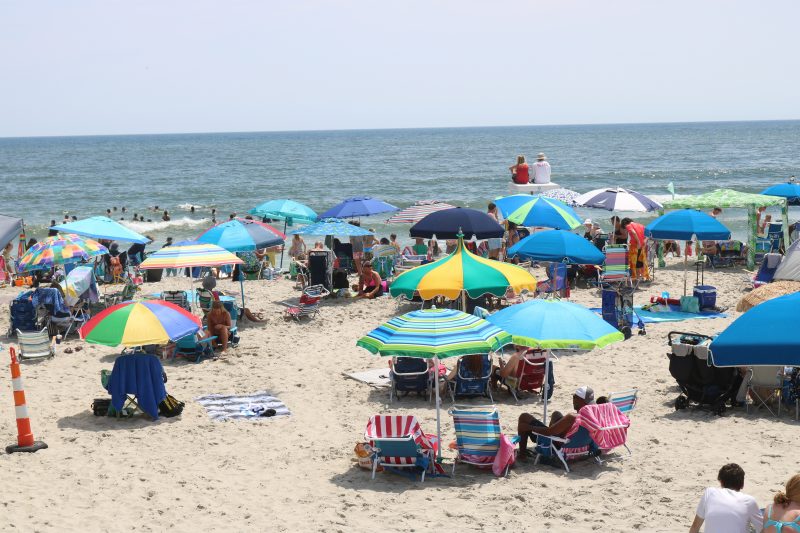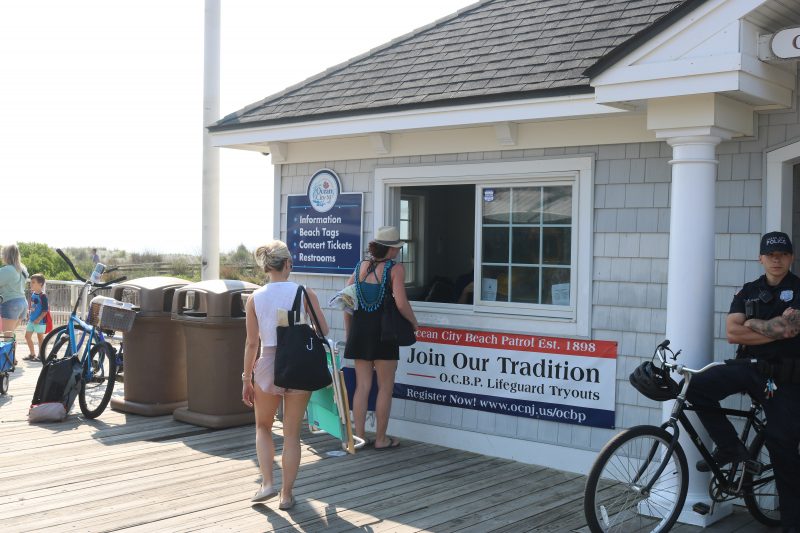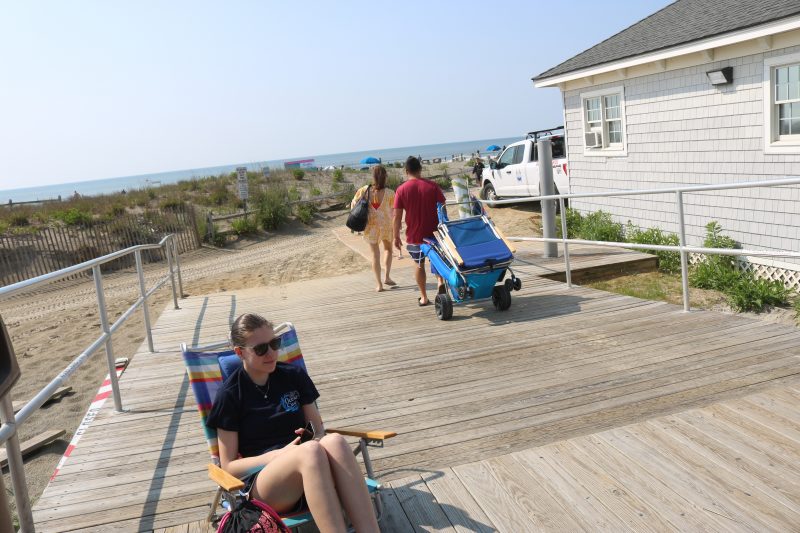 By MADDY VITALE
By MADDY VITALE
Beach tag sales often serve as a major factor in gauging how well a shore town will do in the summer tourism season.
And for Ocean City, the barometer typically shows that there will be a strong summer season, at least that is what has been the case over the past several years.
But with beach tag price increases in effect this year for daily, weekly and seasonal tags, the concern that some visitors may opt for another vacation spot could be a possibility.
Discounted seasonal tags, which had been $20 prior to May 31 in 2022, increased for the 2023 season to $30. The discounted rate ended on May 31 and seasonal tags are now being sold for $35. In addition, weekly beach tags doubled from $10 to $20 for this summer and daily tags jumped from $5 to $10.
Frank Donato, Ocean City’s chief financial officer, said Tuesday that the preseason number of beach tags sold as of May 31 decreased from 111,480 tags to 104,076 beach tags.
However, the increase in prices kept the resort up with total revenue of $3,122,285, an increase from 2022’s $2,229,613.
The end result was a solid start to the summer tourism season.
“So overall, while revenue was up $892,000, the number of beach tags sold was down by about 7,400,” he noted. “Ocean City obviously expected to see an increase in revenue considering the new pricing structure.”
A price increase in beach tags wasn’t likely the only factor in fewer tags being sold during the preseason through May 31, Donato said.

Visitors stop to purchase beach tags at the Ocean City Beach Patrol headquarters at 12th Street beach.
Neighboring Sea Isle City’s CFO Jennifer McIver recently told
Seaislenews.com that Sea Isle's beach tags were down slightly through June 1, and one of the reasons could be cool and rainy weather leading up to the summer season.
Donato agreed.
“While we suspect the price increase may have influenced some buying decisions, we also agree with the comment from Sea Isle that the weather so far this season may have been a factor in the sales being down a bit,” he said. “We had a rainy spring with temps below average which may not have had customers in beach mode yet.”
So despite sales being down a bit in the number of tags sold, “the revenue totals have us well on target to meet our budgeted benchmark of $5.2 million this year,” Donato pointed out Tuesday. “Ocean City was able to anticipate an additional $1.2 million in the budget this year from beach fees due to the pricing increase.”
Beach tag revenue covers the cost of keeping the beaches clean, employing lifeguards, hiring summer police officers and paying for the city’s share of beach replenishment projects in partnership with the U.S. Army Corps of Engineers.
Donato explained at an Oct. 6 City Council meeting that the increase in beach tag prices was needed due to rising costs for the city to maintain, clean and protect the beaches.
“The additional revenue allowed us to keep taxes stable this year by helping to pay for additional costs in beach maintenance, replenishment costs, and lifeguard salaries," he said.
Ocean City has had beach tags since 1976 and they are required from Memorial Day to Labor Day.
Ocean City annually leads all New Jersey shore towns in beach tag sales because of its sheer size. The city’s 7-mile-long beachfront is much bigger than neighboring towns, allowing it to handle enormous summer crowds that can swell to about 150,000 people, compared to the year-round population of about 11,200.

A beach tag checker sits at the entrance to the beach at 12th Street.
 By MADDY VITALE
Beach tag sales often serve as a major factor in gauging how well a shore town will do in the summer tourism season.
And for Ocean City, the barometer typically shows that there will be a strong summer season, at least that is what has been the case over the past several years.
But with beach tag price increases in effect this year for daily, weekly and seasonal tags, the concern that some visitors may opt for another vacation spot could be a possibility.
Discounted seasonal tags, which had been $20 prior to May 31 in 2022, increased for the 2023 season to $30. The discounted rate ended on May 31 and seasonal tags are now being sold for $35. In addition, weekly beach tags doubled from $10 to $20 for this summer and daily tags jumped from $5 to $10.
Frank Donato, Ocean City’s chief financial officer, said Tuesday that the preseason number of beach tags sold as of May 31 decreased from 111,480 tags to 104,076 beach tags.
However, the increase in prices kept the resort up with total revenue of $3,122,285, an increase from 2022’s $2,229,613.
The end result was a solid start to the summer tourism season.
“So overall, while revenue was up $892,000, the number of beach tags sold was down by about 7,400,” he noted. “Ocean City obviously expected to see an increase in revenue considering the new pricing structure.”
A price increase in beach tags wasn’t likely the only factor in fewer tags being sold during the preseason through May 31, Donato said.
By MADDY VITALE
Beach tag sales often serve as a major factor in gauging how well a shore town will do in the summer tourism season.
And for Ocean City, the barometer typically shows that there will be a strong summer season, at least that is what has been the case over the past several years.
But with beach tag price increases in effect this year for daily, weekly and seasonal tags, the concern that some visitors may opt for another vacation spot could be a possibility.
Discounted seasonal tags, which had been $20 prior to May 31 in 2022, increased for the 2023 season to $30. The discounted rate ended on May 31 and seasonal tags are now being sold for $35. In addition, weekly beach tags doubled from $10 to $20 for this summer and daily tags jumped from $5 to $10.
Frank Donato, Ocean City’s chief financial officer, said Tuesday that the preseason number of beach tags sold as of May 31 decreased from 111,480 tags to 104,076 beach tags.
However, the increase in prices kept the resort up with total revenue of $3,122,285, an increase from 2022’s $2,229,613.
The end result was a solid start to the summer tourism season.
“So overall, while revenue was up $892,000, the number of beach tags sold was down by about 7,400,” he noted. “Ocean City obviously expected to see an increase in revenue considering the new pricing structure.”
A price increase in beach tags wasn’t likely the only factor in fewer tags being sold during the preseason through May 31, Donato said.

 A beach tag checker sits at the entrance to the beach at 12th Street.
A beach tag checker sits at the entrance to the beach at 12th Street.